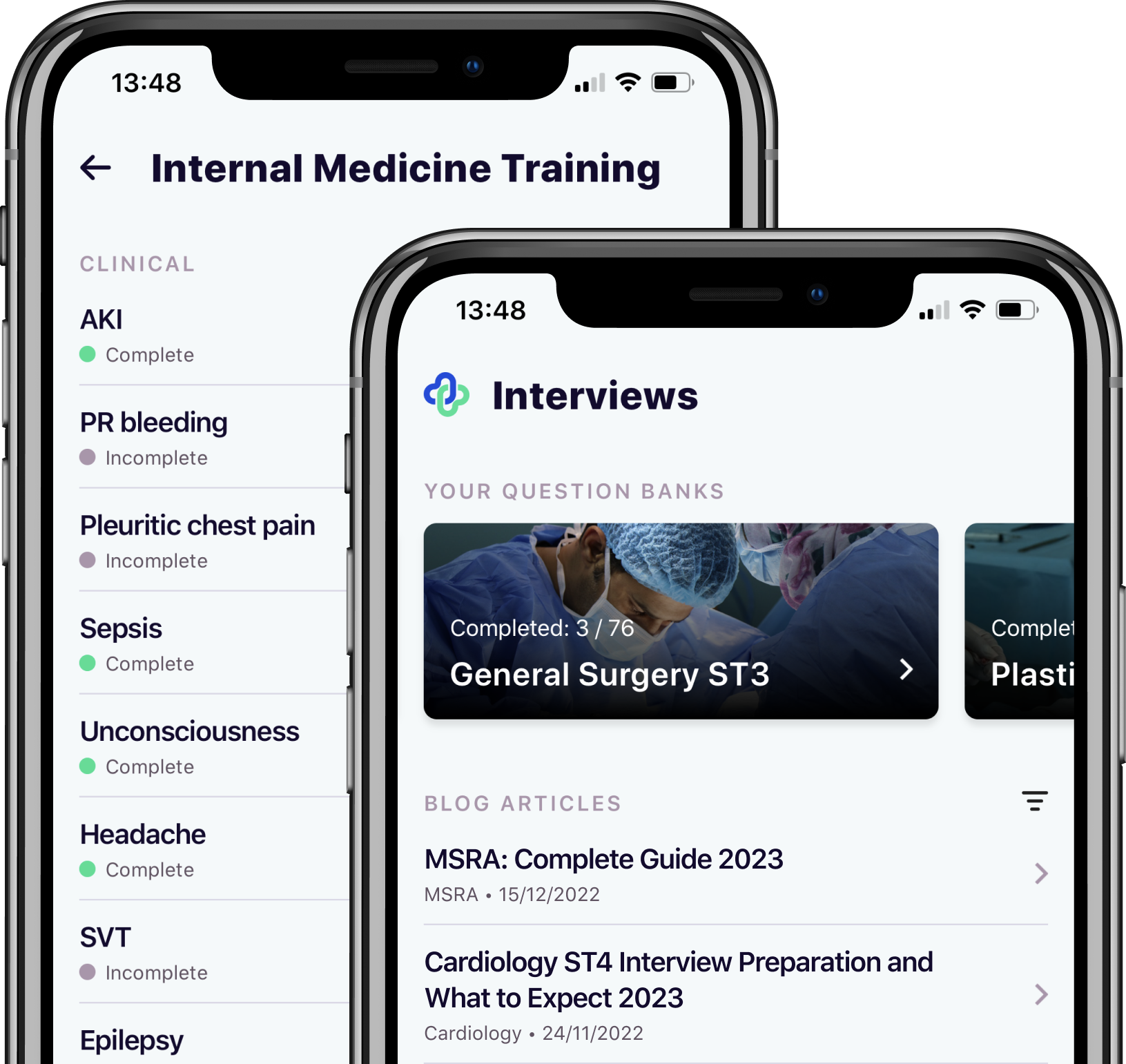
MRCS for Overseas Doctors
If you gained your primary medical qualification outside of the UK and are considering completing the MRCS examination, our MRCS guide for overseas doctors will provide you with all the information you need, including guidance on the online application process, registration with the General Medical Council (GMC) following the exam and even comparison with PLAB and FRCS.
GMC registration with a licence to practise medicine is essential for all doctors practising within the UK. Doctors who qualified outside of the UK must demonstrate that they have the relevant knowledge and skills to practise medicine within the UK, as part of the GMC’s registration process. Successful completion of the MRCS (Part A and Part B) is one method of providing this evidence and is open to all international medical graduates, provided that you meet the eligibility criteria (given below).
MRCS guidance
The MRCS consists of two separate exams: a written paper (Part A) and an objective structured clinical examination (OSCE) (Part B). You must pass Part A before you can apply to sit Part B. Both elements must be successfully completed before the postgraduate diploma and membership to one of the four Royal Colleges of Surgeons of Great Britain and Ireland can be granted.
MRCS Part A – written paper
The MRCS Part A is a five-hour multiple-choice exam consisting of the following two papers:
- Paper 1 – applied basic sciences
- When: AM
- Duration: three hours – divided into two 90-minute sections with a 10-minute comfort break in between
- Number of questions: 180
- Paper 2 – principles of surgery in general
- When: PM
- Duration: two hours
- Number of questions: 120
You can find more information about the exam, including what areas are assessed, in our MRCS Part A Preparation Blog and MRCS Part A Complete Guide. To help you prepare effectively, our AI-powered, adaptive MRCS Part A Question bank contains thousands of practice questions, feedback and further reading. We have several subscription options, so you can choose the best one for you.
MRCS Part B – OSCE
The MRCS Part B is an objective structured clinical exam (OSCE) consisting of 17 examined stations, each lasting nine minutes.
It assesses the following areas:
- Anatomy and surgical pathology
- Applied surgical science and critical care
- Clinical and procedural skills
- Communication skills
For more information, our MRCS Part B Complete Guide covers everything from exam dates to the question types and how to pass. Our MRCS Part B question bank will help you prepare effectively with professionally written exam questions, answer explanations and ‘Station Summaries’ to further your knowledge of the topic areas. Again, we have various subscription options to suit your revision timescale.
MRCS online application
To be eligible for the MRCS exam, if you qualified outside of the UK or Ireland, you must hold a primary medical qualification which is accepted by the Councils of the colleges. The Intercollegiate MRCS Exam website provides further guidance on this and how to check if your medical qualification is acceptable.
Your application for the MRCS must be made via the relevant individual Royal College of Surgeons’ website – either the Royal College of Physicians and Surgeons of Glasgow; the Royal College of Surgeons of Edinburgh; the Royal College of Surgeons of England; or the Royal College of Surgeons of Ireland – through which you want to take the exam. The MRCS is an intercollegiate exam, so you’ll take the same exam regardless of which college you choose to book with.
The deadlines for applying for the upcoming MRCS Part A exams are listed in the section below, as well as information relating to the MRCS Part B exams.
MRCS Part A dates and locations
The MRCS Part A exam is held three times per year, in January, April and September. The upcoming 2026 exam dates, application deadlines and fees for the MRCS Part A can be found in the table below:
| MRCS Part A exam date | Application closing date | Exam fee |
|---|---|---|
| 21 January 2026 | 30 October 2025 | £625 |
| 22 April 2026 | 12 March 2026 | £625 |
| 9 September 2026 | 1 July 2026 | £625 |
The MRCS Part A is delivered in Pearson Vue test centres at various locations within the UK, Ireland and internationally.
MRCS Part B dates and locations
Examination dates and locations vary for MRCS Part B, depending on the Royal College you choose; you can find more information and book your exam on their individual websites (remember you can only do this after you have successfully passed Part A). The closing date for applying for the exam is usually approximately three months prior, as with Part A of the exam.
The upcoming 2026 exam dates can be found in the table below:
| Location | MRCS Part B exam window | Application deadline | Exam fee |
|---|---|---|---|
| Sheffield | 8 — 12 May 2026 | 19 March 2026 | £1,177 |
| London | 14 — 24 May 2026 | 19 March 2026 | £1,177 |
PLAB vs MRCS
As with the MRCS, passing the Professional and Linguistic Assessments Board (PLAB) exam can be used as evidence that you have the required knowledge and skills to practise medicine within the UK, and is an alternative route for applying for GMC registration. Whether you choose to undertake the PLAB or MRCS will not affect your GMC registration, but there are a number of factors that you may wish to consider when deciding.Both the PLAB and MRCS are sufficient for securing a job within the NHS (following successful registration with the GMC). However, MRCS is required for most surgical specialties and is a more appropriate route if you’re looking to undertake a specialist training post in surgery while working in the UK or more senior roles. You can find more information on surgical training in the relevant section below.The difference in cost may also be a consideration. At face value, the total cost of the PLAB exams is cheaper than MRCS; however, as PLAB 2 must be completed at the clinical assessment centre in Manchester (UK), and the MRCS Part B is limited in its examination locations, you may incur additional travel costs on top of the exam fees.Additionally, how much experience you have may be a deciding factor in which exam you opt for. You can take both the PLAB and MRCS immediately after graduating from medical school, provided you meet the eligibility criteria; however, the MRCS candidate guidance recommends that you undertake MRCS Part A in Specialty/Core Training Year 1 (ST/CT1), which is two years after graduation, and Part B in Specialty/Core Training Year 2 (ST/CT2). Therefore, more experience is preferable if considering the MRCS to ensure that you’re not at a disadvantage.Your aspirations for the role/route you’ll take whilst working in the NHS will possibly be the biggest consideration. However, factors such as cost and how much experience you have may also help you decide which is more suitable, PLAB or MRCS.To find out more about the PLAB, visit our PLAB Guide 2024 and PLAB Pathway / Route blogs, or the PLAB section of our website.
FRCS vs MRCS
As with the PLAB or MRCS consideration, the choice whether to complete the Fellowship of the Royal College of Surgeons (FRCS) will depend on your role aspirations; however, your experience will also be a significant factor, as further training and experience is required to be eligible for the FRCS.Successful completion of the MRCS – in addition to meeting other requirements – is essential for entry onto specialty training (ST3 and beyond). Specialty training is the final stage of surgical training before obtaining your Certificate of Completion of Training (CCT), granting you entry to the Specialist Register and allowing you to practise as a substantive consultant surgeon in the NHS. Successful completion of the FRCS exam, however, is an essential requirement for the award of CCT. Surgeons are eligible to take the FRCS exam at the end of their surgical training. The Royal College of Surgeons of England confirms that, if you trained outside of the UK, it’s not necessary to complete the FRCS to work as a consultant within the NHS. However, you are required to gain entry to the specialist register, which can be achieved via the Certificate of Eligibility for Specialist Registration (CESR) route, and the FRCS may help you with this process.The following section has more information on the standard surgical training route.
UK surgical training scheme
The following is the standard training route for surgery within the UK:
- Medical school – 5-6 years
- Foundation training – 2 years
- Core surgical training (CT / ST) – 2 years
- Specialty training (ST3+) – approximately 6 years
- This is the point at which completion of the MRCS examination is required, in addition to other entry criteria.
- Following completion, you’ll be eligible to undertake the FRCS exam.
- Senior medical appointment
- At this point, you’re required to have attained CCT or CESR, before being added to the GMC’s specialist register and being eligible to apply for a consultant post or a fellowship for further, more specialised training.
Although this is the most common route, alternative paths are available, and ‘those who have completed training abroad or not followed the traditional UK pathway can enter training at various points’ provided you can evidence equivalent clinical and professional competencies.The Royal College of Surgeons of England provides further details on every step of the standard surgery training route, including usual entry requirements for each stage.
Salary after MRCS in UK
After successfully completing the MRCS, your expected salary will depend on the role you secure. Passing the MRCS will provide you with a postgraduate diploma and allows you to apply for specialty training (ST3+), provided you also have the relevant experience; however, this is not guaranteed, particularly if you have no previous experience working for the NHS, and a more junior and/or non-training role may be more likely in the first instance.The BMA provides full details of the basic pay scales for junior doctors in training in England and is useful for comparing salary expectations for different grades within the NHS.
GMC registration after MRCS
Once you have passed both parts of the MRCS, you can apply for GMC registration with a licence to practise medicine in the UK. Once the GMC has approved this, you can work as a doctor within the UK.For more information about the MRCS, including preparing for the exam, tips for revising and resources to use, visit our ‘MRCS Part A Complete Guide’, ‘MRCS Part B Complete Guide’ and ‘4 Most Common Mistakes Made by MRCS Candidates’ blogs.

Take your subscriptions with you
Our mobile app allows you to access your interview and exam question banks wherever you are.




